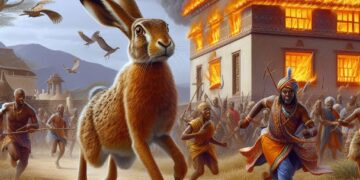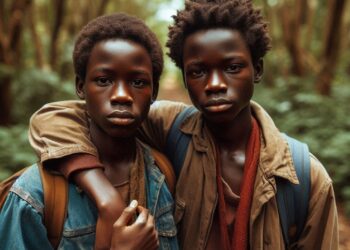Long ago, in the heart of Tororo, there lived a man named Rwamiti and his devoted wife, Kajaaja. Their modest home was a sturdy, thatched-roof cottage, nestled amidst the lush, rolling hills near the base of the imposing Mount Elgon. The aroma of simmering stews, often flavored with local herbs and spices, wafted through the air, mingling with the laughter of their three children who played beneath the shade of a grand jackfruit tree. Surrounding their home was a thriving farm, a vibrant patchwork of nature’s abundance. Tall banana plants, their leaves rustling gently in the breeze, stood alongside neatly planted rows of sweet potatoes and beans, their green tendrils stretching out towards the distant horizon. The rich, dark soil, nourished by the nearby River Malaba, cradled these crops, reflecting the family’s relentless labor and the deep satisfaction they found in their harvests. Their farm was a living testament to their dedication, a picturesque symbol of prosperity and contentment, where each plant and row told a story of love and hard work amidst the beauty of Tororo’s landscape.
One fateful day, the sun blazed with a warmth that promised good fortune, but soon, a calamity darker than a moonless night fell upon them. Like a horde of hungry ants devouring a feast, a ravenous swarm of locusts descended, their numbers blotting out the sky. The fields, once as lush as a grandmother’s garden, were turned into a barren wasteland, leaving only a memory of abundance. The family, once blessed with the fruits of their labor, now faced the harsh reality of empty stomachs and uncertain tomorrows. They wandered like lost cattle in search of sustenance, feeding on wild plants and bitter roots, their hunger gnawing at them like a relentless thief in the night. Each meal was a harsh reminder of their dreams turned to dust, and each day felt like the shadows were closing in, a test of endurance against the encroaching darkness.
But fortune, ever capricious, smiled upon them one miraculous day. As Kajaaja walked through the dense forest near the foot of Mount Elgon, burdened by hunger and worry, she stumbled upon a hidden pumpkin patch. The sight was like a blessing from the spirits of the forest. Her heart, weighed down by relentless pangs of hunger, surged with overwhelming joy at the sight of the ripe, golden pumpkins. Gathering five of the finest specimens, her hands trembling with disbelief and gratitude, she hurried back home. For the first time in weeks, her heart felt lighter as she prepared a meal of pumpkin stew, the savory aroma filling their home and offering a fleeting respite from their struggles.
Rwamiti, driven by a curious desire to understand and improve their situation, noticed the change in their fortunes and inquired about the pumpkins. Kajaaja, knowing Rwamiti’s impulsive nature often led to unintended consequences, feared that revealing the secret might bring more misfortune. She kept the location hidden, worried that his well-meaning but hasty actions could ruin their newfound blessing. Intrigued, Rwamiti followed her into the forest the next day and discovered the pumpkin patch. His heart swelled with hope as he began clearing the weeds, believing this would yield an even better harvest. Sadly, his well-meaning efforts led to the pumpkins withering and drying up. Seeing Kajaaja’s heartbroken face, Rwamiti felt a profound regret, realizing that his sincere curiosity had unwittingly deepened their troubles.
Undeterred by this setback, Kajaaja ventured deeper into the forest. Her perseverance was rewarded when she discovered a well filled with the purest milk. The sight was like another miracle from the spirits. Overjoyed, she gathered some of the milk and hurried back home, her heart lifting with each step. That evening, the family enjoyed a hearty meal, the richness of the milk restoring a sense of comfort and hope. However, Rwamiti, driven by his relentless desire to improve their fortunes, attempted to deepen and widen the well, believing it would bring even greater blessings. His interference, though well-intentioned, caused the well to dry up, plunging Kajaaja into sorrow once more.
Desperation took hold of Kajaaja. She sat beneath the grand jackfruit tree, her tears mingling with the fallen leaves as she mourned their misfortune. At that moment, a kind bird fluttered down and perched beside her. “Why do you weep, dear one?” the bird asked. Kajaaja poured out her heart, sharing their tale of woe. Touched by her plight, the bird miraculously filled her basket with millet. Kajaaja, her spirits lifted by this unexpected gift, hurried back home to prepare a nourishing meal for her hungry three children and sad husband, her hope renewed.
But Rwamiti’s curiosity, mingled with a growing sense of desperation, gnawed at him like a relentless swarm of tse-tse flies. Torn between the compelling urge to uncover the source of their newfound fortune and his mounting anxiety, he followed Kajaaja through the dense forest, his heart racing with internal conflict. When he saw the bird’s miraculous gift, his initial awe was quickly overshadowed by a burgeoning greed. In his desperation, he grappled with the temptation to demand more, his hands trembling as he reached out, driven by the fear of losing this precious chance. The bird, startled and frightened by his aggressive demands, took flight, disappearing into the sky like a fleeting shadow over the slopes of Mount Elgon. The sight of the empty basket, now filled with nothing but dust, struck Rwamiti like a blow to the chest, his own actions having unraveled the fragile thread of hope that had begun to mend their lives.
Realizing the extent of the damage his actions had inflicted, Kajaaja’s heart shattered into a thousand pieces. With each painful step she took, carrying her children, her sorrow deepened. Their home, once a sanctuary of love, now felt like a distant dream. The grand jackfruit tree, which had witnessed their joys and struggles, stood as a silent sentinel, its branches casting long shadows over their departure. As she led her children away, each step felt like a wound reopening, the path back to her parents’ home marked by the heavy burden of loss and heartbreak. The sounds of their footsteps seemed to echo her despair, the forest now a dark, grieving landscape that mirrored her soul.
Rwamiti, left behind, watched as the figures of his family grew smaller and smaller, their retreat a painful reminder of his failures. The house, once vibrant with life, now stood silent and cold, a stark contrast to the warmth it once held. The realization of his greed and curiosity, now crystallized into an unbearable ache, crushed him with the weight of his own regret. His world, once full of promise, had crumbled into solitude and poverty. The stark emptiness around him was a relentless reminder of the love he had lost. In his anguish, he understood, too late, that his insatiable desire for more had not only stripped him of his family but had also condemned him to a life of profound loneliness.
Rwamiti’s story, now a haunting echo through the ages, serves as a heartrending reminder of how the ceaseless chase for more can lead to the ultimate loss of what truly matters—love, family, and the solace of togetherness..
















